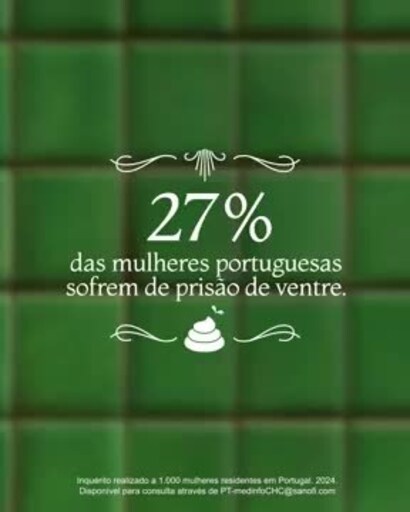LISBON, Portugal, Dec. 5, 2024 /PRNewswire/ -- As the festive season approaches, many of us look forward to Christmas gatherings and delicious food and drink. However, the indulgence that often accompanies these celebrations can have a significant impact on our bowels.
Holiday overindulging can disrupt the delicate balance of our digestive system, and with the addition of increased socialising away from home, the risk of constipation rises further, with research showing people are stopping themselves going to the toilet when they need to go.
According to data from DulcoLax, 28%* of people in Portugal suffer constipation, hard dry stools or irregular bowel movement, with 70%** of people surveyed revealing they have experienced bloating and 58% suffer bowel pain or cramps.
The issue of seasonal constipation is exacerbated with many people, particularly women, preventing themselves from having a bowel movement until they get home, with 20%*** of 18 – 34-year-old women agreeing this is because they were told in childhood that going for a poo was dirty, inappropriate and embarrassing.
Constipation during the Christmas season can be a result of several seasonal factors:
- Overindulgence: The festive season is typically associated with rich, fatty foods, and increased alcohol consumption, all of which can slow down digestion and lead to constipation.
- Dehydration: The combination of festive drinks, such as alcohol and sugary beverages, and decreased overall fluid intake can contribute to dehydration, which can worsen constipation.
- Sedentary Lifestyle: Reduced physical activity due to festive holidays, travel, and relaxation can also contribute to constipation.
- Stress: The emotional and social stress which is often associated with the busy festive season can affect digestion and contribute to constipation.
Data indicates some digestive issues affect women more, with 53% of women experiencing bloating as opposed to 47% of men, and bowel pain affecting 44% women verses 39% of men. Thirty-eight percent of women*** agree men and women are treated differently during childhood when it comes to talking about going for a poo, leading to shame and embarrassment in later life. Women feel reluctant talking about bowel habits with over half (53%) of women in Portugal admitting they feel very embarrassed discussing the topic with anyone.
DulcoLax's 'Princess and the Poo' book - an unconventional fairytale book, with princesses unapologetically announcing they need to poo while in various everyday scenarios - is now available in 17 libraries across the city, including the Palacio Galveias, as well as the nation on https://www.dulcolax.com/pt-pt/princesastambemfazemcoco/. This educational website also includes advice on how to enforce positive toilet habits, as a woman and a parent.
The book is part of DulcoLax's Pooping Princesses campaign, challenging "perfect princess" stereotypes to help break pooing taboo and end the generational cycle of toilet shame. The aim is to normalise conversations amongst women and families about going for a poo, to stop them feeling embarrassed and preventing themselves from going to the toilet when they need to, which puts them at risk of constipation.
Pedro Gouveia, Country Head for Portugal at Opella comments: "Christmas is a time for celebration, which we wholeheartedly encourage, but it's important to also take care of your health. Too much rich food, dehydration and lack of physical activity can all contribute to constipation at this time of year. Our research shows women in Portugal are embarrassed about pooping and hold in going to the toilet until they are at home, which can lead to extra discomfort during the busy holiday period. By prioritising self-care and encouraging healthy conversations about this natural bodily function, we can reduce the risk of constipation and fully enjoy the festivities."
A series of Pooping Princess images have also been released on social, with an interactive Instagram filter that transforms people into a digitally drawn princess on the toilet and advice to help break the taboo on DulcoLax's educational hub page.
Follow and share the #AsPrincesasTambémFazemCocó campaign on @DulcoLax.PT
Notes to editors
*Results based on survey of 500 adults in Portugal (18 years old and above), Opella Incidence Tracker, October 2024
** Results based on survey of 500 adults in Portugal (18 years old and above), Opella Incidence Tracker, April 2024
***Results based on a survey of 1,000 Portuguese men and women (18 years old and above) and 1,000 parents in Portugal with daughters, conducted by Toluna. Data was gathered in April 2024.
Pooping Princesses is a behaviour change campaign that highlights DulcoLax's expertise in constipation relief by raising awareness of normalising pooing conversations for all women to help stop the feeling of shame and risk constipation for women today, breaking the cycle for the next generation.
Dulcolax® (bisacodyl) for constipation. It should not be taken daily for long periods. Prolonged and excessive use may cause electrolyte imbalance and hypokalaemia. Children < 10 years of age with chronic or persistent constipation should only be treated under medical supervision. Administration during pregnancy only under medical supervision. Read the information leaflet carefully. If you have any doubts or symptoms persist, consult your doctor or pharmacist. (4.0) MAT-PT-2400163 (1.0) July 2024
Video - https://mma.prnewswire.com/media/2573278/DulcoLax.mp4
Image - https://mma.prnewswire.com/media/2573277/DulcoLax.jpg
Logo - https://mma.prnewswire.com/media/2566941/5060396/Dulcolax_logo.jpg


Share this article